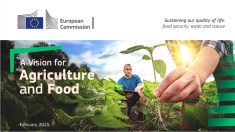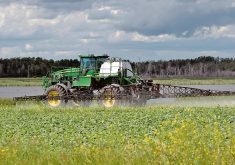Groups are concerned the government plans to look outside the Pest Management Regulatory Agency for scientific advice
The federal government has started a process that could change how pesticides are registered and regulated in Canada.
The process is still in the early stages, but some commodity groups and industry associations are concerned about the potential consequences to farmers and the agriculture sector.
They fear that Health Canada could shift toward a European model, where political pressure and public sentiment influence which pesticides make it to market and which products are banned.
“Now is the time for the Government of Canada to put politics aside and stand behind science-based regulation for pesticides. If the government truly believes in Canadian agriculture’s potential to be a global superpower, now is the time for actions to support the words,” Tyler Bjornson, executive vice-president of the Canada Grains Council, said in a statement from Advancing Agriculture, which represents CropLife Canada and several commodity groups.
Read Also

Using artificial intelligence in agriculture starts with the right data
Good data is critical as the agriculture sector increasingly adopts new AI technology to drive efficiency, sustainability and trust across all levels of the value chain.
In March, Health Canada started consultations on a review of the Pest Control Products Act. The review of the act is part of a broader effort to transform the Pest Management Regulatory Agency (PMRA).
Last August, the government invested $42 million “to further strengthen its human and environmental health and safety oversight and protection, including improving the availability of independent data to further support pesticide review decisions, and the transparency of decision-making,” Health Canada said in the consultation document.
“The investment will also allow the creation of a new expert panel process to provide advice, as appropriate, prior to evidence-based decisions of PMRA on pesticides.”
The document is broad and vague, but some of the language is concerning, said Pierre Petelle, chief executive officer and president of CropLife Canada.
For instance, the government said it wants more “independent scientific advice” to regulate pesticides.
But, if Health Canada creates an independent panel to provide “advice” on pesticides, it suggests that government scientists are biased and ignore some of the scientific evidence.
“The expertise lies within Health Canada. If you don’t think your own department is impartial and expert, that sends a very troubling signal,” Petelle said from his home office in Ottawa.
“This perception that there’s untapped science out there, that the PMRA is only looking at some of the science, that’s a complete falsehood.”
Assuming that Health Canada goes ahead and creates such a panel, it raises a list of questions, Petelle said, such as, who will sit on the advisory committee, what authority will it have, and what would happen if the panel and PMRA scientists reach a different conclusion?
As an example, PMRA scientists spent more than seven years reviewing neonicotinoids and their impact on bee health. Neonics, as they’re commonly known, are a group of insecticides applied to all of the canola and corn seeds in Canada and a portion of the soybean seeds.
In 2019, the PMRA decided some uses of neonics should be cancelled and introduced new restrictions to protect bees, but other uses of neonics could continue.
If there was an independent scientific committee that reviewed PMRA decisions, panelists may have said that no risk to bees is acceptable, so all uses of neonics should be banned.
That creates a situation where pesticide regulation becomes political. It would make Canada more like Europe, where environmental groups and political sentiment have a large influence on pesticide regulation.
To prevent such a scenario, Advancing Agriculture is asking farmers and farm groups to submit a letter to the Health Canada consultation on the Pest Control Products Act.
The deadline for the consultation is May 20. Advancing Agriculture has a website link where farmers and others can easily submit a standard letter to Health Canada.
“The agricultural community must have a strong voice,” Bjornson said, “(in order) to counter the voice of those groups who oppose modern agriculture.”
















